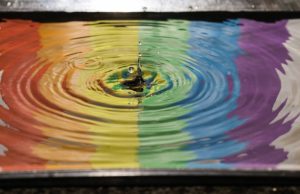LGBTQ Visions of Peace in a Society Emerging from Conflict

In April 2021, PaCCS Communications Officer Kate McNeil spoke with Ulster University reader Dr Fidelma Ashe, an expert in transnational justice, to speak about her work as Principal Investigator on the AHRC-funded LGBTQ Visions of Peace in a Society Emerging from Conflict project. The outcomes of this research were featured in her 2019 book Gender, Nationalism and Conflict Transformation: New Themes and Old Problems in Northern Ireland Politics.
Kate McNeil: Thank you for taking the time to speak with me today. Would you mind getting started by telling me a bit about your work on LGBTQ Visions of Peace in a Society Emerging from Conflict, including some of the broad goals of the research and how this project fit into your career more broadly?
Dr Fidelma Ashe: I have worked on gender inclusion issues and deeply divided societies for quite some time, and I was always concerned the work was not intersectional enough. I wanted to do more work in the area of sexuality and gender identity. Gender identity equality and sexual equality were quite controversial in Northern Ireland – particularly in terms of responses from the political elite – and against that background I developed a project that aimed to include LGBTQ people in conflict transformation. I wanted to capture the visions and perspectives on peace from members of these marginalized groups, and to share them in public spaces while focusing on inclusion, facilitation, and public expression.
How did you go about conducting this research?
The research was conducted over 16 months using three interrelated methods. We convened focus groups with LGBTQ people across Northern Ireland where we discussed their experiences during the conflict and after the peace agreement. We also facilitated artistic workshops which took the material from the focus groups and tried to represent LGBTQ visions of peace through creative mediums including photography, with the resulting photographs being exhibited in public services in Northern Ireland. Finally, we sourced a director who worked with participants to develop a script around the perspectives which emerged from the focus groups and workshops, that was developed into a play that dealt with issues of harm, exclusion, and the possibilities of the future for LGBTQ people in Northern Ireland.
What impact has emerged from your work? What were some of the project’s key outcomes?
The key impact was enabling LGBTQ people who had been excluded from conversations about peace and from developing expressions of peace in public spaces to do so. Another key outcome was enabling audiences to reflect on representations of those expressions and to engage in discussion about them. I am still in contact with several of the participants from the research, and we have had people from more rural areas come into Belfast to meet friends, relocate, and transition. So, some people’s lives completely changed, and people had the time and space to express themselves and consider those issues through the focus groups and the creative workshops. Developing a common assessment of the peace process gave them the space to think about their own position and moving peace forward. Some of them were quite young people, and our research gave them the opportunity to learn skills, to meet each other, and to create a community.
In terms of a broader impact on society, the work provided the basis for me to work on an expert panel to advise government on an inclusion strategy, which was quite a substantial move forward in our society. I worked with three experts from the NGO sector and we developed a strategy document that was signed off by the minister, so the research really did inform the work I did on that strategy.
The project also benefitted the NGOs we worked with, by providing data to them on visions of peace. I placed an article in Open Democracy that reframed the positioning of LGTBQ people in Northern Ireland and their advocacy groups, arguing that these identities were the most progressive forces in terms of peacebuilding – that they have moved society forward, developing a case for celebration of diversity, inclusion, and meaningful equality. They have moved into the realm of human rights in a way that separates them from peacebuilding, but they were key actors in terms of progressing a positive vision of peace that was inclusive and progressive.
What are you researching now?
The narratives have shifted in Northern Ireland – after Brexit there was a lot of debate about Irish unity, and that has increased. So, my work has moved to gender and sexual inclusion in that space, with the support of funding from the Irish Department of Foreign Affairs and the Joseph Rowntree Trust.



